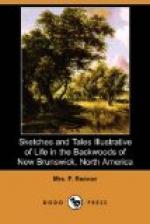The indefatigable Melancthon had four miles to “haul”
his marketable wood; but, when the roads were bad,
he was chopping and clearing at the same time, and
when the snow was well beaten down, with his little
French horse and light sled he soon drew it to the
place from whence the boats are loaded in the spring.
Dinner being now finished, and after some conversation,
which must of course be of a very local description,
although it is brightened with many a quiet touch of
wit, of which the natives possess a great original
fund, and Melancthon, having finished in the forenoon
harrowing in his buck-wheat, has now gone with his
axe to hew at a house-frame which he has in preparation,
and Sybel and I having settled our affair of warp
and woof, it is now time for me to proceed. She
with her large Swiss-looking sun-hat, placed lightly
on her brow, accompanies me to the “bars,”
and there, having parted with her, we will now resume
our walk. The next lot presents one of those
scenes of desolation and decay which will sometimes
appear even in this land of improvement. What
had once been a large clearing is now grown wild with
bushes, the stumps have all sprouted afresh, and the
fences fallen to the ground. The house presents
that least-respectable of all ruins, a deserted log-building.
There is no solidity of material nor remains of architectural
beauty to make us respect its fate. ’Tis
decay in its plainest and most uninteresting aspect.
A few flowers have been planted near the house, and
even now, where the weeds grow dark and rank, a fair
young rose is waving her lovely head. The person
who had gone thus far on in the toils of settling
was from England, but the love of his native land
burned all too bright within his heart. In vain
he toiled on those rude fields, and though his own,
they seemed not his home. The spirit voices of
the land of his childhood called him back—he
obeyed their spell, and just at the time his labours
would have been repaid, he left, and, with all the
money he could procure, paid his passage to England,
where he soon after died in the workhouse of his parish.
Yet even there the thought, perhaps, might soothe him,
that though he filled a pauper’s grave, it was
in the soil where his fathers slept. The forsaken
lot is still unclaimed, for people prefer the woodlands
to those neglected clearings, from which to procure
a crop infinitely more trouble and expense would be
required than in taking it at once from the forest.
Our way is not now so lonely as it was in the morning.
Parties of the male population are frequently passing.
One of the settlers has to-day a “barn-raising
frolic,” and thither they are bound. They
present a fair specimen of their class in the forest
settlements. The bushwhacker has nothing of the
“bog-trotter” in his appearance, and his
step is firm and free, as though he trod on marble
floor. The attire of the younger parties which,
although coarse, is perfectly clean and whole, has
nothing rustic in its arrangement. His kersey




